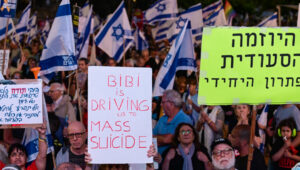Today Israel chooses a new leadership, and the Palestinian street has a deeply vested interest in the outcome of the ballot.
However, this time around most Palestinians understood that the Israeli-Palestinian conflict was far from the central issue in the vote for the 20th Knesset, and that most Israelis would be casting their ballots based on economic issues plaguing the Jewish state.
From the Palestinian point of view, the situation is less than desirable, as their nationalist struggle is no longer the primary issue motivating Israeli voters. Most Palestinians realize that a majority in Israeli society has totally lost confidence in reaching a viable, lasting peace with the Palestinian leadership.
“It is only natural for us to be interested in the political process of our conquerors,” Mohammed Madani, a senior member of the ruling Palestinian faction Fatah, told Israel’s NRG news agency. “Their policies affect our lives, because Israelis are killing Palestinians daily [sic]. We don’t care who wins in Israel. What’s important for us is who can conclude a peace treaty.”
Taking to social media, many average Palestinians expressed hope for a fresh government in Israel, while others feared Netanyahu would only grow stronger. Many Palestinians were rooting for the United Arab List, which some pre-election polls suggested could possibly become the Knesset’s third largest faction, thus bringing the Palestinian issue back into the spotlight.
From its power base in Gaza, Hamas also closely followed the Israeli elections. “We don’t care who wins the elections in Israel,” said Hamas spokesman Fawzi Barhoum. “All parties in Israel have only one goal and that is to destroy Palestinian interests and Judaize the country.”
Gaza-based Palestinian analyst Talal Oukal stressed that the overriding agenda of any Israeli government would be to preserve a united Jerusalem under Israeli rule.











